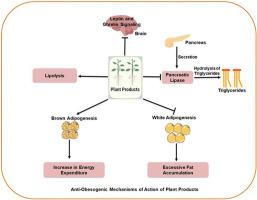当前位置:
X-MOL 学术
›
Phytochemistry
›
论文详情
Our official English website, www.x-mol.net, welcomes your feedback! (Note: you will need to create a separate account there.)
Mechanisms of action for the anti-obesogenic activities of phytochemicals
Phytochemistry ( IF 3.8 ) Pub Date : 2020-12-01 , DOI: 10.1016/j.phytochem.2020.112513 Bilal Ahmad , Emily P. Friar , Muhammad Sufyan Vohra , Michelle D. Garrett , Christopher J. Serpell , Isabel Lim Fong , Eng Hwa Wong
Phytochemistry ( IF 3.8 ) Pub Date : 2020-12-01 , DOI: 10.1016/j.phytochem.2020.112513 Bilal Ahmad , Emily P. Friar , Muhammad Sufyan Vohra , Michelle D. Garrett , Christopher J. Serpell , Isabel Lim Fong , Eng Hwa Wong

|
The prevalence of obesity is increasing rapidly globally and has recently reached pandemic proportions. It is a multifactorial disorder linked to a number of non-communicable diseases such as type-2 diabetes, cardiovascular disease, and cancer. Over-nutrition and a sedentary lifestyle are considered the most significant causes of obesity; a healthy lifestyle and behavioural interventions are the most powerful ways to achieve successful weight loss, but to maintain this in the long term can prove difficult for many individuals, without medical intervention. Various pharmacological anti-obesogenic drugs have been tested and marketed in the past and have been moderately successful in the management of obesity, but their adverse effects on human health often outweigh the benefits. Natural products from plants, either in the form of crude extracts or purified phytochemicals, have been shown to have anti-obesogenic properties and are generally considered as nontoxic and cost-effective compared to synthetic alternatives. These plant products combat obesity by targeting the various pathways and/or regulatory functions intricately linked to obesity. Their mechanisms of action include inhibition of pancreatic lipase activities, an increase in energy expenditure, appetite regulation, lipolytic effects, and inhibition of white adipose tissue development. In this review, we discuss the distinct anti-obesogenic properties of recently reported plant extracts and specific bioactive compounds, along with their molecular mechanisms of action. This review will provide a common platform for understanding the different causes of obesity and the possible approaches to using plant products in tackling this worldwide health issue.
中文翻译:

植物化学物质抗肥胖活性的作用机制
肥胖症在全球范围内迅速增加,最近已达到大流行的程度。它是一种多因素疾病,与许多非传染性疾病有关,例如 2 型糖尿病、心血管疾病和癌症。营养过剩和久坐不动的生活方式被认为是肥胖的最重要原因;健康的生活方式和行为干预是实现成功减肥的最有效方法,但对于许多人来说,如果没有医疗干预,要长期保持这一点可能会很困难。过去已经测试和销售了各种药理抗肥胖药物,并且在肥胖管理方面取得了一定的成功,但它们对人类健康的不利影响往往大于收益。来自植物的天然产物,以粗提物或纯化植物化学物质的形式,已被证明具有抗肥胖特性,并且与合成替代品相比,通常被认为是无毒且具有成本效益的。这些植物产品通过靶向与肥胖症密切相关的各种途径和/或调节功能来对抗肥胖症。它们的作用机制包括抑制胰脂肪酶活性、增加能量消耗、调节食欲、脂肪分解作用和抑制白色脂肪组织的发育。在这篇综述中,我们讨论了最近报道的植物提取物和特定生物活性化合物的独特抗肥胖特性,以及它们的分子作用机制。
更新日期:2020-12-01
中文翻译:

植物化学物质抗肥胖活性的作用机制
肥胖症在全球范围内迅速增加,最近已达到大流行的程度。它是一种多因素疾病,与许多非传染性疾病有关,例如 2 型糖尿病、心血管疾病和癌症。营养过剩和久坐不动的生活方式被认为是肥胖的最重要原因;健康的生活方式和行为干预是实现成功减肥的最有效方法,但对于许多人来说,如果没有医疗干预,要长期保持这一点可能会很困难。过去已经测试和销售了各种药理抗肥胖药物,并且在肥胖管理方面取得了一定的成功,但它们对人类健康的不利影响往往大于收益。来自植物的天然产物,以粗提物或纯化植物化学物质的形式,已被证明具有抗肥胖特性,并且与合成替代品相比,通常被认为是无毒且具有成本效益的。这些植物产品通过靶向与肥胖症密切相关的各种途径和/或调节功能来对抗肥胖症。它们的作用机制包括抑制胰脂肪酶活性、增加能量消耗、调节食欲、脂肪分解作用和抑制白色脂肪组织的发育。在这篇综述中,我们讨论了最近报道的植物提取物和特定生物活性化合物的独特抗肥胖特性,以及它们的分子作用机制。


























 京公网安备 11010802027423号
京公网安备 11010802027423号